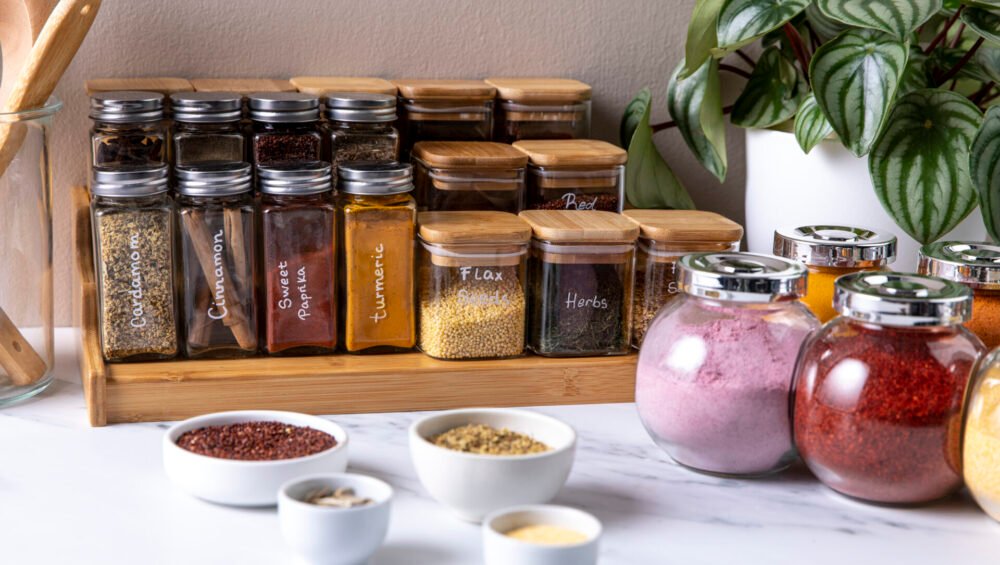Spices are like tiny treasures in our kitchen—they hold the power to transform a bland dish into a masterpiece bursting with flavor. But here’s the problem: no matter how exotic or expensive your masalas are, if you don’t store them properly, they lose their magic. Have you ever opened a jar of turmeric or cinnamon only to find that it smells dull and flat? That’s what happens when spices aren’t stored with care.
In this article, we’ll explore how to store spices for maximum freshness and flavor, using simple, practical tips anyone can follow. Think of it as giving your spice a long, happy life, so they can continue to provide you with amazing meals.
Why Proper Spice Storage Matters
Spices aren’t just condiments; they’re the heart of flavor in any cuisine. Without proper storage, you’re essentially throwing money away. Poorly stored spice lose their aroma, potency, and flavor—the very reasons we buy them. Imagine investing in premium saffron or cardamom only to let them go stale in a few months. Storing seasonings correctly ensures that every pinch you use adds the punch it was meant to.
How Long Do Masalas Last?
Contrary to what many think, masalas don’t last forever. Their shelf life depends on whether they’re whole or ground:
- Whole spices (like cloves, peppercorns, cinnamon sticks) can last up to 2–4 years.
- Ground spices (like turmeric, paprika, and cumin powder) usually stay fresh for 1–2 years.
- Herbs (like dried basil, parsley, oregano) typically last about 1 year.
Remember, expired spices aren’t harmful, but they lose their strength. So, while old chili powder won’t make you sick, it won’t make your curry sing either.
Whole vs.Ground: Which Lasts Longer?
Think of whole spice as “locked treasure chests” and ground spice as “open treasure boxes.” Whole Herbs lock in essential oils, protecting their flavor for years. Grinding them exposes those oils to air, which speeds up flavor loss.
Pro tip: Buy whole masalas when possible and grind them fresh in small batches. Yes, it takes a little effort, but the flavor payoff is huge!
The Enemies of Spices: Light, Heat, Air, and Moisture
Seasonings have four major enemies:
- Light: Direct sunlight fades their color and potency.
- Heat: Warmth makes essential oils evaporate faster.
- Air: Exposure to oxygen dulls flavor over time.
- Moisture: Causes clumping, mold, and spoilage.
Avoid leaving spice jars near your stove or windows. It’s like leaving chocolate in the sun—you’ll regret it!
Best Storage Containers for Spices
The right container makes a big difference.
- Airtight glass jars are the gold standard.
- Opaque or dark-colored jars protect against light.
- Tin containers work well but can rust if exposed to moisture.
- Plastic jars are fine, but flavors may cling to the plastic.
Whatever container you choose, make sure it’s airtight. Masalas hate air as much as we hate stale chips.
Should You Store Spices in the Fridge or Freezer?
This is a common question. For most masalas, the answer is no—fridges and freezers introduce moisture. However, there are exceptions:
- Paprika and chili powder can benefit from refrigeration, especially in humid climates.
- Nuts and seeds (like sesame or flax) stay fresh longer in the fridge.
If you do refrigerate, seal spices in airtight jars to avoid condensation.
The Ideal Spot in Your Kitchen for Storing Spices
The perfect place is:
- Cool (away from ovens and stoves)
- Dry (no exposure to steam or humidity)
- Dark (inside a cupboard, drawer, or pantry)
Think of it this way: if you wouldn’t leave chocolate there, don’t leave spices there either.
Labeling and Organizing Your Spice Collection
Have you ever grabbed cumin thinking it was cinnamon? That’s a kitchen disaster waiting to happen.
Tips for spice organization:
- Label jars with the spice name and purchase date.
- Arrange spices alphabetically or by cuisine type.
- Use tiered racks or drawer inserts to save space.
Good organization not only saves time but also helps track freshness.
How to Store Exotic and Rare Spices
Special spices like saffron, vanilla beans, or star anise deserve extra care.
- Saffron: Wrap in foil, store in an airtight glass, and keep in a dark place.
- Vanilla beans: Store in airtight tubes or jars, away from sunlight.
- Star anise & cardamom: Best kept whole to preserve oils.
When you pay a premium for rare spices, storing them correctly is essential.
Storing Fresh Herbs and Converting Them to Spices
Fresh herbs like basil, mint, or thyme can be dried and stored as spices.
Steps:
- Wash and pat herbs dry.
- Air-dry or use a dehydrator.
- Store in airtight jars once fully dry.
This way, you extend their life and always have your favorite herbs on hand.
Mistakes to Avoid When Storing Spices
- Keeping spices in paper packets—they let in air and moisture.
- Placing jars near stovetops—heat kills flavor.
- Not sealing lids tightly—flavor escapes, and pests might enter.
Avoid these mistakes, and your spices will reward you with rich taste for longer.
DIY Tips for Extending the Life of Spices
- Add a silica gel packet (like the ones in shoe boxes) to prevent moisture.
- Use small jars to minimize air exposure.
- Buy in small quantities if you don’t cook often.
Buying a kilo of turmeric might seem economical, but it’s a waste if half of it goes stale.
How to Test If Your Spices Are Still Fresh
Not sure if your spice is still usable? Try this:
- Smell test: If it smells faint or “dusty,” it’s old.
- Taste test: Dab a little on your tongue. If it lacks punch, it’s expired.
- Color test: Vibrant colors usually mean freshness.
If all three tests fail, it’s time to say goodbye.
Sustainable and Eco-Friendly Spice Storage Options
If you’re eco-conscious, consider these ideas:
- Reuse glass jars from sauces or jams.
- Buy spice in bulk refills to cut packaging waste.
- Opt for metal tins or bamboo containers.
This way, you keep your herbs while being kind to the planet.
Storing masalas is both an art and a science. When you protect them from light, heat, air, and moisture, every spoonful adds rich aroma and flavor to your meals. Whether you’re just learning to cook or already a seasoned chef, the right storage habits make a big difference in taste.
If you want to enjoy the freshest flavors, choose Nature’s Spice. Our organic whole spices and finely ground spices are carefully packed to keep their natural goodness intact—helping you create dishes that are vibrant, authentic, and full of life.
FAQs
1. How often should I replace my spice?
Most ground spices should be replaced every 1–2 years, while whole spices can last up to 4 years if stored properly.
2. Can I still use masalas past their expiration date?
Yes, but they’ll likely be weaker in flavor. Expired masalas aren’t harmful, just less effective.
3. What’s the best way to store chili powder in humid climates?
Please keep it in an airtight jar in the fridge to prevent clumping and mold.
4. Should I grind my own spice at home?
Yes! Grinding whole spices at home keeps them fresher and enhances flavor.
5. Are plastic spice containers safe for long-term storage?
They’re fine for short-term use, but glass or metal containers are better to prevent flavor loss.




